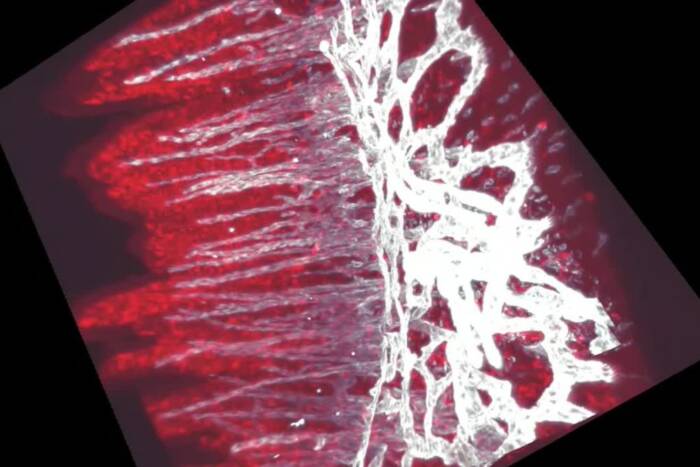Tenure awarded to RNA researcher Thomas Tuschl
by THANIA BENIOS
 Biochemist Thomas Tuschl, head of Rockefeller University’s Laboratory of RNA Molecular Biology, has been awarded tenure and promoted to professor. Dr. Tuschl, who studies the mechanisms by which RNA can regulate genes, has been instrumental in uncovering the intricate roles played by microRNAs in gene expression. The new appointment, approved by the Board of Trustees earlier this year, was effective July 1.
Biochemist Thomas Tuschl, head of Rockefeller University’s Laboratory of RNA Molecular Biology, has been awarded tenure and promoted to professor. Dr. Tuschl, who studies the mechanisms by which RNA can regulate genes, has been instrumental in uncovering the intricate roles played by microRNAs in gene expression. The new appointment, approved by the Board of Trustees earlier this year, was effective July 1.
Dr. Tuschl, who received his Ph.D. in chemistry from the University of Regensburg, in Germany, came to Rockefeller as an associate professor in 2003, following a postdoc at the Massachusetts Institute of Technology and a position as junior investigator at the Max Planck Institute for Biophysical Chemistry in Goettingen, Germany. He is also a Howard Hughes Medical Institute investigator, a position he has held since 2005.
Dr. Tuschl’s research focuses on RNA interference (RNAi), the process by which small RNA molecules interfere with gene expression. For many years, RNAs were seen simply as vehicles that transport genetic information from the nucleus to the site of protein synthesis, but it has become obvious that particular small RNA molecules can regulate this process in a gene-specific manner.
Working with the fruit fly Drosophila melanogaster, Dr. Tuschl and his colleagues showed that long double-stranded RNAs generate short double-stranded RNAs called small interfering RNAs (siRNAs), and that these short molecules mediate RNAi gene silencing. Dr. Tuschl then became the first to show that this gene-silencing machinery exists in mammalian cells, a discovery that helped create an entire industry of producing small RNAs and exploring their therapeutic applications.
Once Dr. Tuschl and his colleagues saw that this small RNA machinery could selectively turn off genes in mammals, including humans, they further dissected its mechanism of action by identifying which proteins these small RNAs recognize. Building off their work and that of others, they then identified the now well-known molecules called microRNAs, the natural small RNA occupants of the RNA silencing machinery, and ultimately went on to create a microRNA atlas that defines microRNA gene expression in both healthy and diseased tissues.
“It was a very intense time in the field,” says Dr. Tuschl. “It was very competitive, trying to get the first key findings defining the biochemistry of RNA interference and understand how small RNAs could connect with diseases and be put to use clinically.”
Researchers, including Dr. Tuschl, have since discovered some 500 microRNAs in human cells that have been shown to play key roles in a host of diseases ranging from Alzheimer’s disease to cancer. “We now believe that the RNA interference caused by microRNAs is actually one of the most important mechanisms in gene expression,” says Tuschl. “A more precise understanding of the role of RNAs in the cell could also provide a novel approach to new therapies.”
“Rockefeller is known for its bold and innovative research,” says Rockefeller president Paul Nurse. “And Tom has not only flourished in this environment but has become an influential leader and pioneer in his field.”
Dr. Tuschl has received numerous awards, including the Ernst Jung Prize for Medicine in 2008, the Max Delbruck Medal and the Karl Heinz Beckurtz Award in 2007, and in 2003 the Wiley Prize in Biomedical Sciences from the Wiley Foundation, the New York City Mayor’s Award for Excellence in Science and Technology and the Newcomb Cleveland Prize from the American Association for the Advancement of Science.


